As some of you know, I was trained as an historian. I have a PhD in American history from Brown where I studied Early American History under Gordon Wood. My subject focus was 17th century New England. I decided, as you can see, not to become an academic – something I discussed here. But I never lost the simple curiosity and hunger to know about the past. All I ever read on my own time is history. I don’t read novels or books about politics or about almost anything else that has to do with day job or anything else but history or biography to the extent it is a literary annex of history. And that’s made me for some time want to set up a history blog here at TPM.
What I’m most interested in for these purposes isn’t narratives or discussions of the past so much as artifacts – documents, images, objects, the physical remnants of the past that elucidate it, bring it to life or perhaps shock us with the distance and closeness of past worlds. These seem like good touchpoints for brief discussions and they’re fascinating and captivating in themselves. It’s something I would like to see and read myself.
I was a graduate student in though most of the 90s when the digitization of history was just beginning. I should probably say ‘internetization’ since digitization in a few forms had been underway for a while. But if you were doing historical research, virtually nothing was available online. This wasn’t just the case with primary documents but also the vast back catalogues of journal articles and published research. The exceptions were only available to universities at massive cost. Even dissertations, which have been available on microfiche for decades, weren’t online.
All of this is to say that when I see all the historical material that is available today online it’s astonishing. I don’t have as much of a sense of the amount of primary material available in a systematic way – what you need if you’re doing deep primary research – as opposed to a lot of ‘best of’ material made available online by various historical archives. But even the latter has created troves of material.
I first got the idea from a series of tweets from Michael Beschloss – photographs, documents, letters. They were fascinating in themselves. But they gave me a sense of the possibilities with how much is now available in a digital form – something I confirmed by hunting around on the Library of Congress’s site and other major archives. But I wanted to know a bit more, have a bit more discussion than of course was possible in a tweet.
So that’s what I’m interested in doing. If you’d like to be part of it, I’d like to hear from you. I’d imagine the most logical people would be history grad students or professors, but that’s not a qualification. What’s required is a real familiarity with a broad cross-section of history, a sense of what is visually and historically captivating as well as what is shareable and accessible online.
If you’re interested, let me know.






